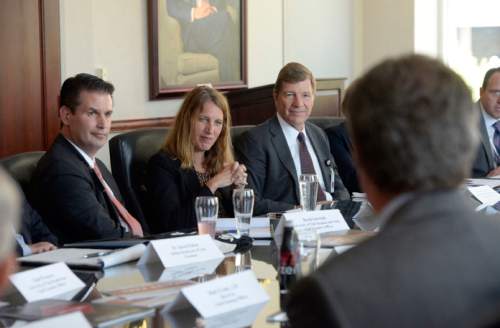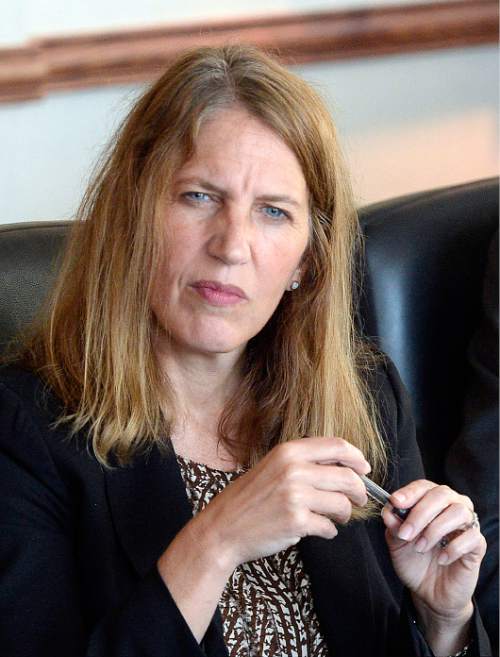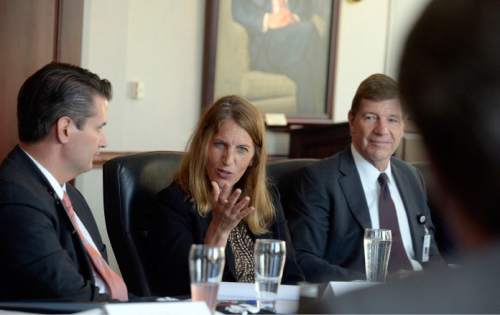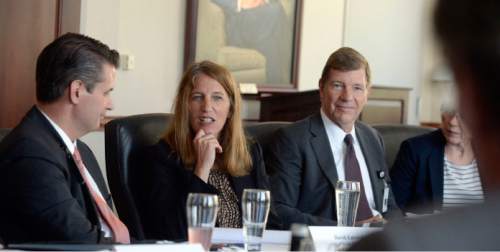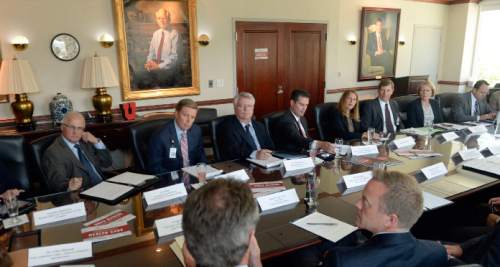This is an archived article that was published on sltrib.com in 2015, and information in the article may be outdated. It is provided only for personal research purposes and may not be reprinted.
The University of Utah's top attorney, John Morris, will have three appointments Friday at the U. Hospital: a 10 a.m. for lab work, a 10:30 a.m. with his oncologist and a noon date for chemotherapy.
But the fact he deals with only one person — a scheduler who clusters his appointments — makes a huge difference in his ability to fight the pancreatic cancer he was diagnosed with 21 months ago.
"I still work. I have a busy life," said Morris, who shared his experience of health care reform with a top Obama administration executive visiting Utah on Thursday. "The fact they are able to make it efficient is very helpful, very patient-centric."
Sylvia Burwell, secretary of the U.S. Department of Health and Human Services (HHS), was in Salt Lake City to meet with nearly two dozen medical providers, insurers and state health officials. A roundtable discussion on delivery-system reform, closed to the news media, was followed by a private meeting among Burwell, Gov. Gary Herbert and legislative leaders who are trying to hammer out a Medicaid expansion plan that can pass HHS muster.
Members of the Gang of Six, as they are dubbed, shared the basics of their proposal to have hospitals, doctors and pharmacies kick in the state's 10 percent share of the cost of expanding Medicaid.
The proposal, said House Speaker Greg Hughes, R-Draper, would cover those making up to 138 percent of poverty. He previously had opposed going above 100 percent, but that was when he thought taxpayers would be on the hook.
Burwell said HHS approval would depend on the whole package, not any particular waiver Utah seeks to existing Medicaid rules.
"I think she understands what we're trying to accomplish," said Rep. Jim Dunnigan, R-Taylorsville, "and wants to help us get across the finish line."
Senate President Wayne Niederhauser, a Sandy Republican, called Burwell's visit a "show of good faith."
"It was very productive," he said. "There's a good relationship going with the secretary of health." Burwell promised her staff will continue to work with the Gang of Six, "so when we run a bill, it's something they can approve."
After the meeting, a Herbert spokeswoman said the governor would have no comment.
In between the two meetings Thursday, Burwell said in an interview that she wanted to talk reform with health care leaders here because they have a reputation for innovation. She's having similar roundtables in cities across the country.
The U. is cutting edge in terms of transparency (with provider ratings on the website) and having teams, such as Morris' providers, who coordinate their care of a patient. Intermountain Healthcare is a leader in data and information, she said.
"Utah is terrific in terms of innovation … which is health care that has the consumer at the center and empowered," Burwell said. "We are on a path and a journey, and there are some great leaders here that we can learn from."
In the roundtable with providers, insurers and a patient — Morris — Burwell also sought feedback on what the feds can do better.
Medicare and Medicaid account for a third of medical dollars spent in the country, so federal rules dictate much of what hospitals, doctors and insurers do.
Providers drilled down on some issues, such as a recent change in federal rules that they haven't seen, but still must comply with.
"She listened, not just talked," said Michelle McComber, chief executive of the Utah Medical Association.
Former Utah Gov. Mike Leavitt, who also served as secretary of HHS and the administrator of the U.S. Environmental Protection Agency during the Bush administration, was also in the room. He now has a consulting company.
"It's always good," Leavitt said, "when people who are on the ground talk with people who make decisions about what should happen on the ground."
Matthew Slonaker, executive director of the Utah Health Policy Project, said it was good to hear Burwell emphasize the importance of the consumer in health reform.
Burwell said the conversations in Utah were consistent with others nationwide in that they zeroed in on three reforms that must happen in U.S. health care: revisions in how treatment is paid for that focuses on patient outcomes, not quantity of procedures; changes to how it's delivered, so the patient is at the center; and better use of data and information.
Twitter: @KristenMoulton


